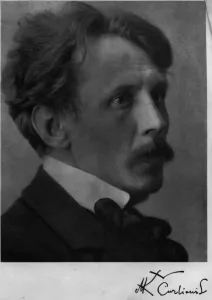AND REDIRECTED TO MIRROR SERVER.
IF YOU ARE NOT BOT PLEASE VERIFY YOUR BROWSER IDENTIFICATION:
Mozilla/5.0 AppleWebKit/537.36 (KHTML, like Gecko; compatible; ClaudeBot/1.0; +claudebot@anthropic.com)

MIKALOJUS KONSTANTINAS ČIURLIONIS.
Mikalojus Konstantinas Čiurlionis (1875-1911) was the most famous Lithuanian composer and painter of international significance. His symbolist musical conceptualism embodied in the cycles of pictorial sonatas and preludes- fugues hitherto remains a unique phenomenon of art.
Compositions for piano constitute the largest and the richest part of Čiurlionis` musical legacy. During the period of 10-12 years beginning with the first sonata composed during his studies and finishing with the preludes and a Fugue in B flat minor composed during his last summer, M.K. Čiurlionis made a chain of remarkable discoveries. The spirit of romanticism and archetypal national way of hearing the world was the initial space from which the composer developed condensed expressionistic, transparent neoclassical, and symbolically constructionist trends toward the New Music. (As it was understood in his Lithuanian and Polish environment at the beginning of the 20th century). He worked very intensively, writing a wealth of mature compositions, including several dozens of real piano masterpieces among them.
Some noteworthy biographical facts: in 1899 he received a diploma in composition (for cantata De Profundis) from Warshaw Music Institute or Conservatoire, where he studied with Prof. Z. Noskowski. In 1901- 1902 Čiurlionis honed his compositional skills in Leipzig Conservatoire under eminent German pedagogues- composition and orchestration Prof. Carl Reinecke and the expert of counterpoint Prof. Salomon Jadassohn, receiving an official certificate in the summer of 1902. After that he studied art, painted, displayed his works in exhibitions in Warsaw, Vilnius, St Petersburg, earning his bread and butter by giving private music lessons. His compositions include significant symphonic (tone poems In the Forest (1901) and The Sea (1907)) and choral works. For some time he led Lithuanian choirs in Warsaw and Vilnius, appeared in concerts as a conductor and pianist. He was one of the founders of the Lithuanian Art Society in Vilnius, initiated a music division there and the first competition for Lithuanian composers. He had the ambition and started composing the Lithuanian national opera, and he also made sketches for its scenography. M.K. Čiurlionis also wrote articles on the subjects of Lithuanian singing folklore, folk art and national culture. During the short time that fate had bestowed on him, Čiurlionis flashed as one of the brightest luminaries of Lithuanian national movement.
<...>
Vytautas Landsbergis
(M.K. Čiurlionis. Compositions for Piano. Completed, 2004)
Main Supporters

 *}
*}
Media sponsor


Organizers



Member of


Partners


























 Lietuvių
Lietuvių